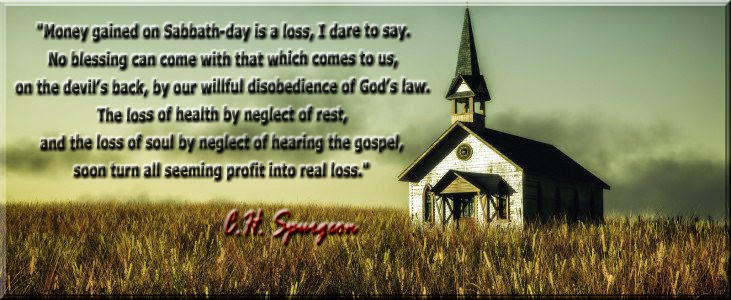[Editor’s Note: Some P&P Contributors hold to the 1689 Confession, some are Calvinistic dispensationalists that do not, and one rowdy contributor isn’t even a Calvinist – the horror. We may not all agree on the sabbatarian nature of the Lord’s Day, but we would all like you to enjoy this day of rest and worship in Jesus Christ]
The following is an excerpt from a sermon by Charles Spurgeon on the Lord’s Day, which you can find here. Please read it and enjoy your Sabbath rest in Jesus:
CHARLES SPURGEON
For verily I say unto you, Till heaven and earth pass, one jot or one tittle shall in no wise pass from the law, till all be fulfilled.” (Matthew 5:18)
It has been said that he who understands the two covenants is a theologian, and this is, no doubt, true. I may also say that the man who knows the relative positions of the Law and the Gospel has the keys of the situation in the matter of doctrine. The relationship of the Law to myself, and how it condemns me; the relationship of the Gospel to myself, and how if I be a believer it justifies me–these are two points which every Christian man should clearly understand… We are not under the law as the method of salvation, but we delight to see the law in the hand of Christ, and desire to obey the Lord in all things.
Jesus did not come to change the law, but he came to explain it, and that very fact shows that it remains, for there is no need to explain that which is abrogated. Upon one particular point in which there happened to be a little ceremonialism involved, namely, the keeping of the Sabbath, our Lord enlarged, and showed that the Jewish idea was not the true one. The Pharisees forbade even the doing of works of necessity and mercy, such as rubbing ears of corn to satisfy hunger, and healing the sick. Our Lord Jesus showed that it was not at all according to the mind of God to forbid these things. In straining over the letter, and carrying an outward observance to excess, they had missed the spirit of the Sabbath law, which suggested works of piety such as truly hallow the day. He showed that Sabbatic rest was not mere inaction, and he said, “My Father worketh hitherto, and I work.” He pointed to the priests who labored hard at offering sacrifices, and said of them, “the priests in the temple profane the Sabbath, and are blameless.” They were doing divine service, and were within the law. To meet the popular error he took care to do some of his grandest miracles upon the Sabbath-day; and though this excited great wrath against him, as though he were a law-breaker, yet he did it on purpose that they might see that the Sabbath was made for man and not man for the Sabbath, and that it is meant to be a day for doing that which honors God and blesses men. O that men knew how to keep the spiritual Sabbath by a easing from all servile work, and from all work done for self, The rest of faith is the true Sabbath, and the service of God is the most acceptable hallowing of the day. Oh that the day were wholly spent in serving God and doing good!
The sum of our Lord’s teaching was that works of necessity, works of mercy, and works of piety are lawful on the Sabbath. He did explain the law in that point and in others, yet that explanation did not alter the command, but only removed the rust of tradition which had settled upon it. By thus explaining the law he confirmed it; he could not have meant to abolish it or he would not have needed to expound it.











